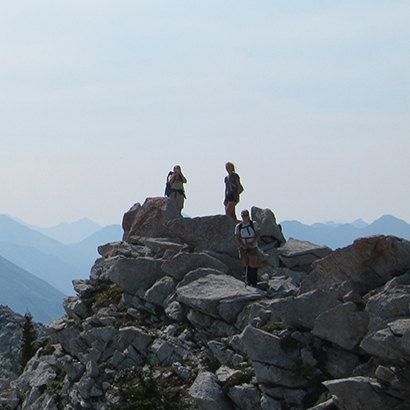Program History
Innovative Education: Wilderness and Civilization
In the decade following passage of the Wilderness Act, federal agencies began making decisions about our nation's last roadless areas. The ensuing decision-making process provoked controversy between conflicting interests. Once lands were designated as Wilderness, management challenges persisted. Acceptable policies, guidelines, and procedures were needed in order to achieve the goals of the Wilderness Act. Because wilderness management was a young and essentially unprecedented field, new expertise, and interdisciplinary skills were needed. And, despite the passage of the Wilderness Act, many Americans were unfamiliar with the multifaceted values of wilderness.
In 1971, the predecessor of the Wilderness and Civilization Program, known as the the Round River Experiment, was established to facilitate hands-on wilderness education for undergraduate students. The program was based on the educational philosophy put forward by Aldo Leopold in his essay “The Round River.” One of the founding concepts of the Round River Experiment was focused on a “reverse of specialization; instead of learning more and more about less and less, we must learn more about the whole biotic landscape” (1953).
In May, 1974, a group of 19 scientists, educators, land managers, and conservationists created the Wilderness Institute (WI) to respond to a variety of wildland issues. Meeting at the University of Montana's Lubrecht Forest, they developed the goals, programs, and structure of an organization that would be an experimental response to the local, regional and national issues of wildands allocation and management. In the fall of 1976, the Regents of the Montana System of Higher Education established the Wilderness Institute as a formal unit in the University of Montana's School of Forestry. The WI's founders hoped that the new institute could help mediate wildland conflicts by providing information and educational programs with the goals of increasing public awareness and developing professional expertise.
Over the years, the Wilderness Institute has completed a large variety of environmental projects and programs. At the heart of our long-term success is the Wilderness and Civilization Program — an undergraduate wilderness studies program since 1975. One of the first of its kind in the nation, it remains unique in the field of experiential education today. The Institute's interdisciplinary Wilderness and Civilization Program has attracted and trained more than 1,000 students since its inception and since 1990 these students have received a minor in Wilderness Studies for their efforts. Many of the program's alumni have gone on to leadership roles in conservation organizations, wilderness education, land management agencies, and their communities.
The Wilderness and Civilization Program is guided by the philosophy that wildlands are becoming increasingly significant, ecologically and socially, and educated dialog about the role of wild places in our nation's future should be promoted. This dialogue should include the integration of wildland values into mainstream American understanding of the natural world and our place within it. The fragmented and complex nature of both wilderness and society, demand continued exploration of the wilderness idea, wilderness management, and the roles of unprotected wildlands.
The Program embraces integrated thinking and a diversity of perspectives and disciplines. The Wilderness Institute is in a unique position, as a component of the University of Montana, to apply multidisciplinary resources and a range of research and educational approaches to our mission.
Please check in regularly to learn more about alumni events or contact us at wi@cfc.umt.edu
Celebrating Nearly 1,000 Alumni!
The Wilderness and Civilization Program has attracted and trained nearly 1,000 students since its inception in 1974. Many of the program's alumni have gone on to leadership roles in conservation organizations, wilderness education, land management agencies, and their communities.
Read more
Wilderness and Civilization: Two Decades of Wilderness Higher Education. The International Journal of Wilderness.
The Role of University Wilderness Education in America: A Conceptual Design. Rocky Mountain Research Station Proceedings. 2000.
